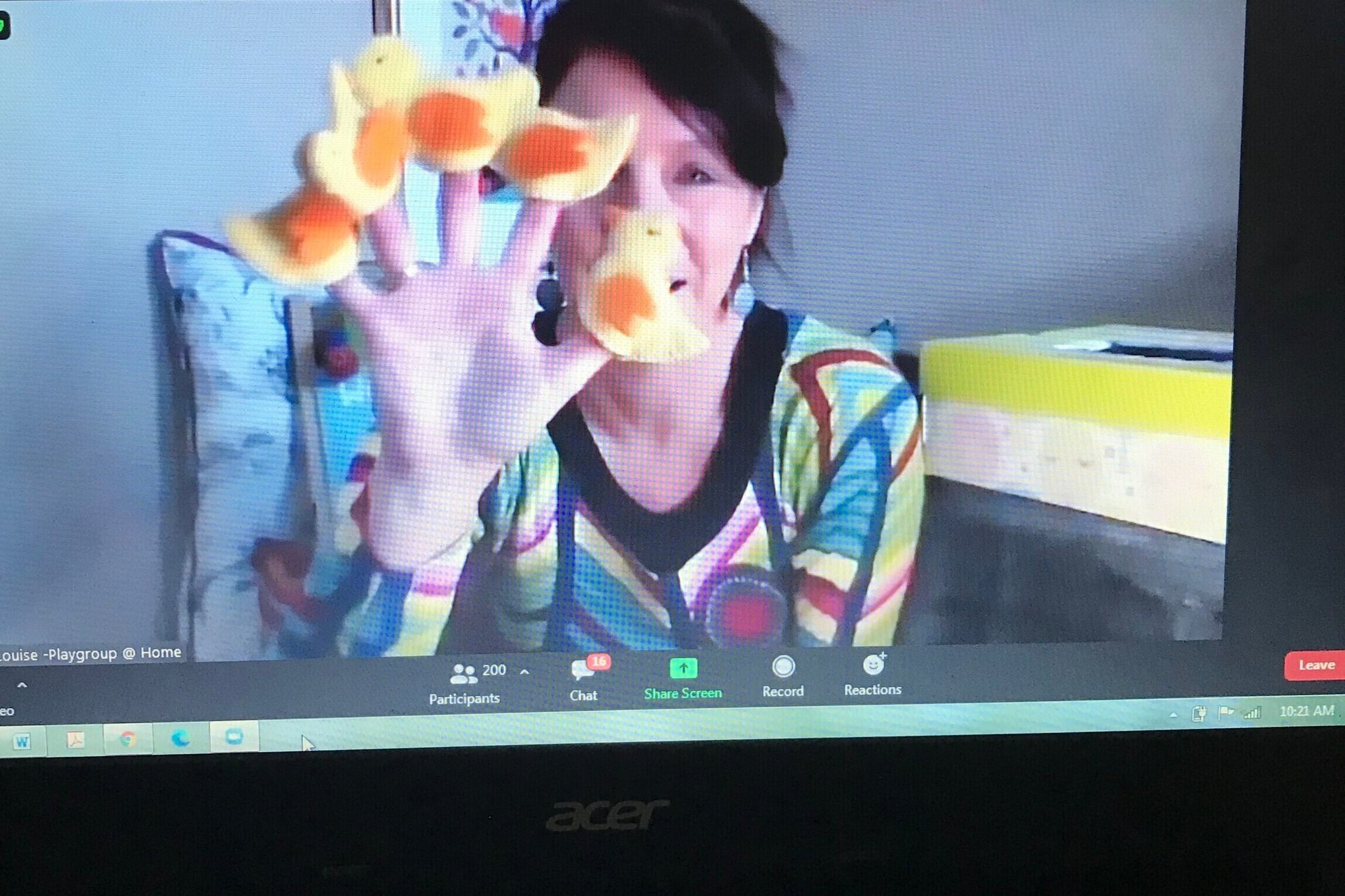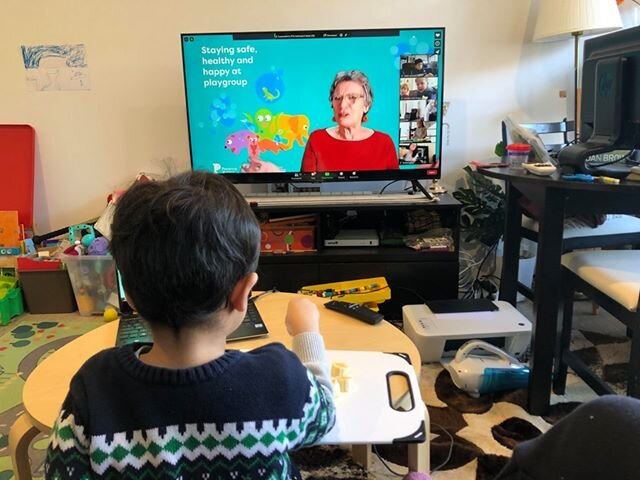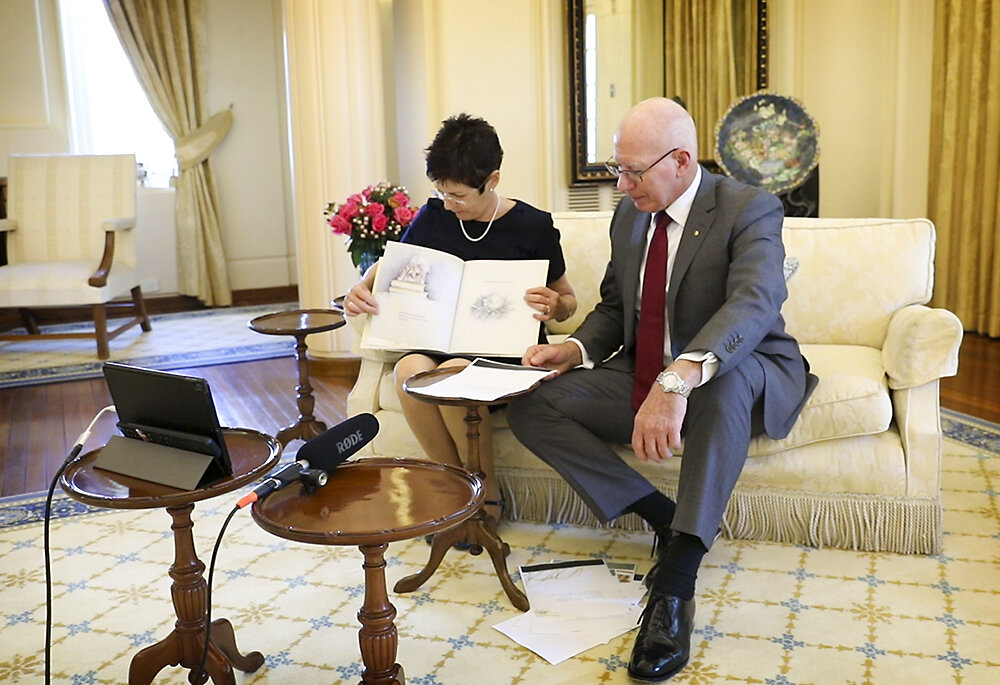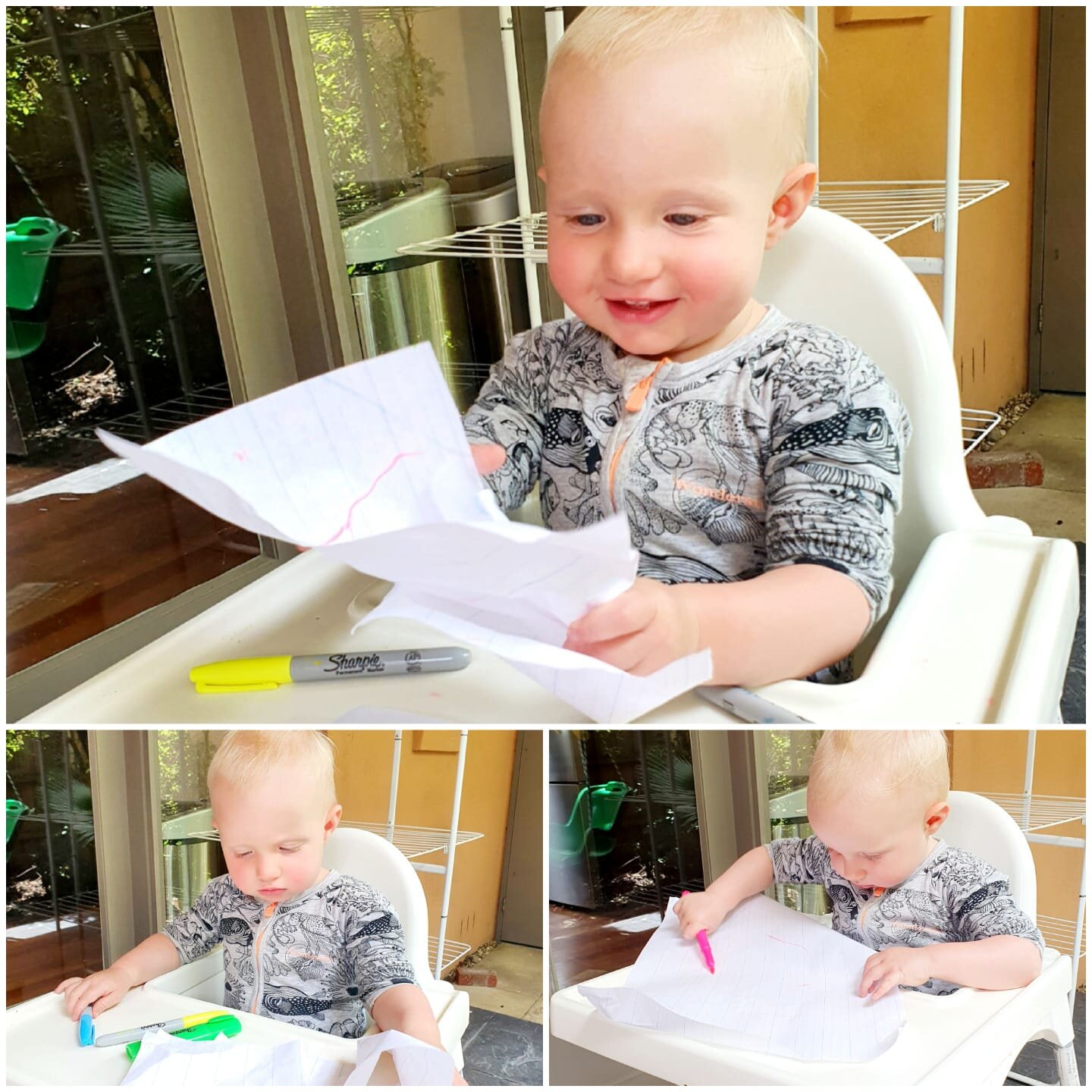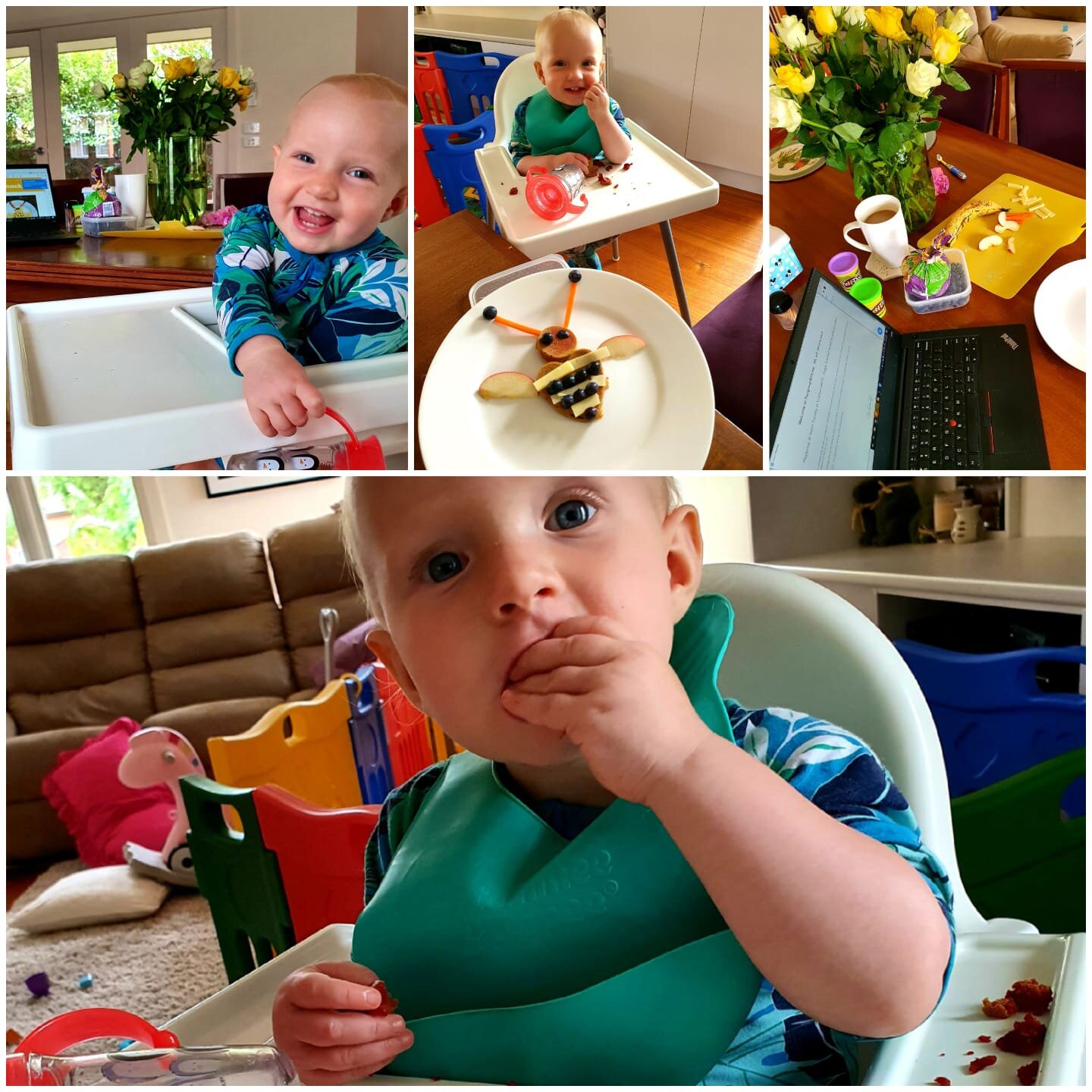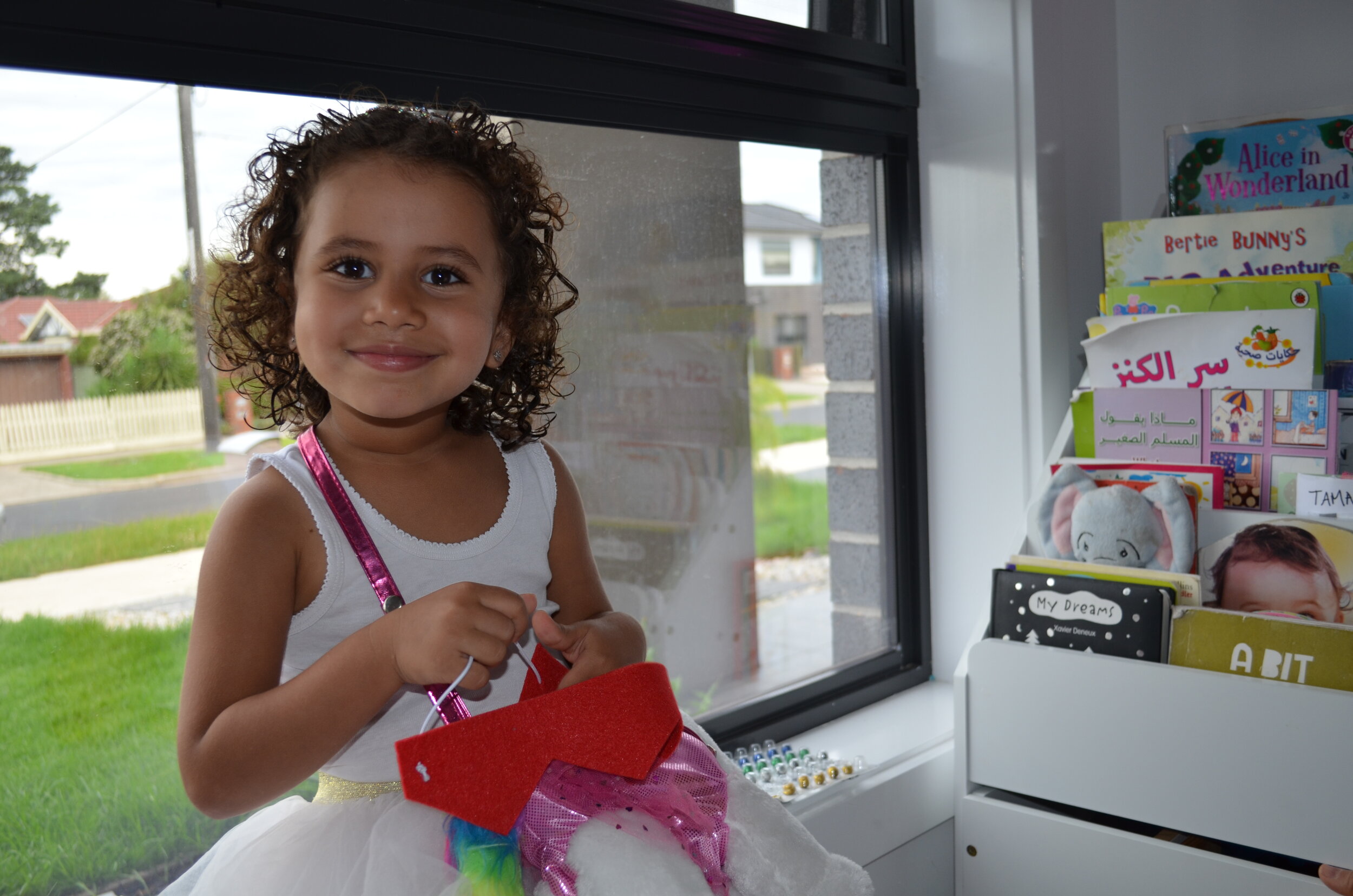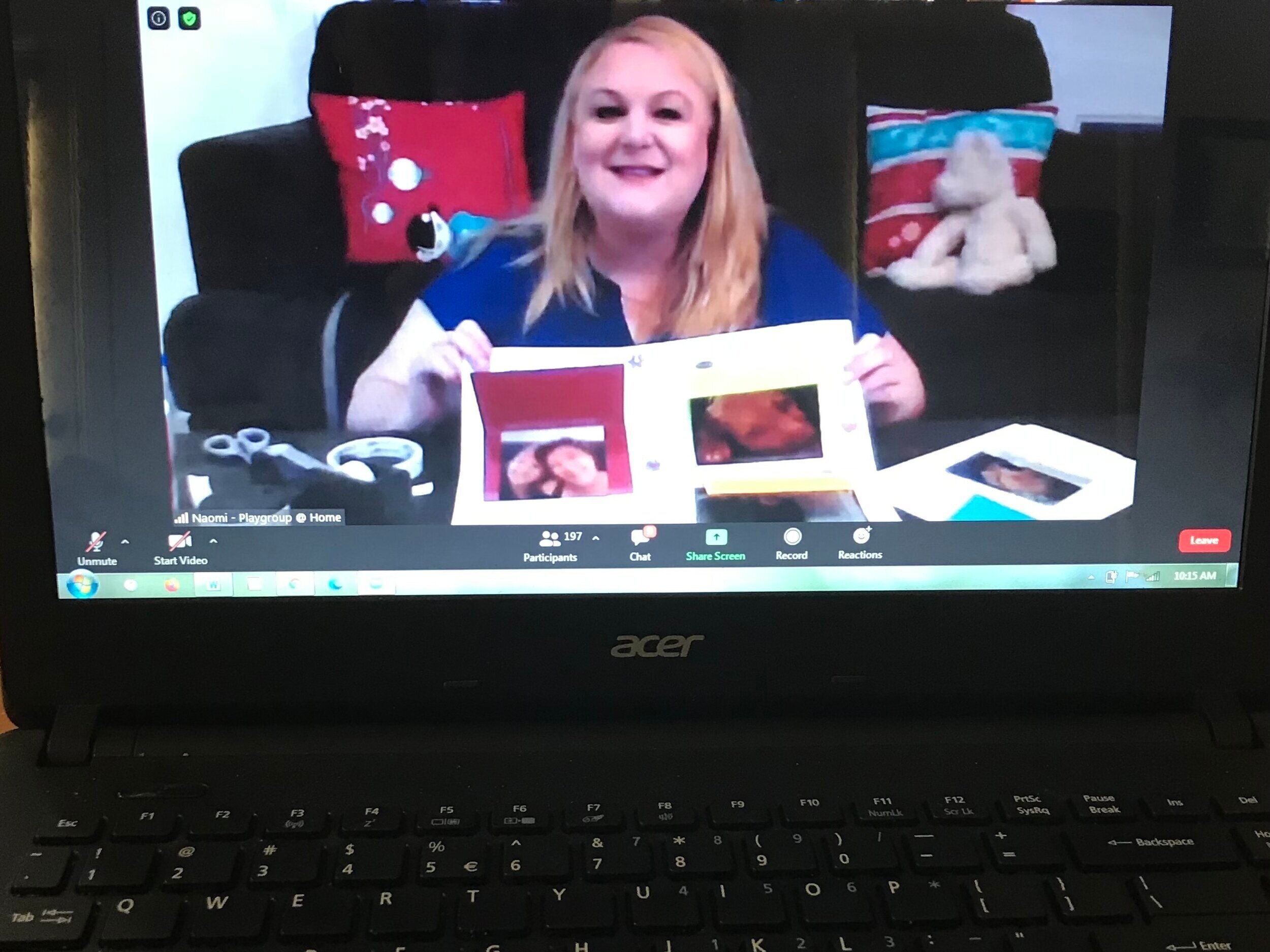Playgroup at Home
Strong Connections Even When We’re Apart
ON A Thursday morning in July, many little faces appeared online, chattering excitedly and waving at the camera. Victoria was in its second hard lockdown as COVID-19 cases began to surge. While some of the children understood that they were staying home to avoid getting sick, lots more were left wondering why they couldn’t go out and play with their friends. So began their Playgroup at Home experience, a live and interactive refuge for many families, riding out the uncertainty of a pandemic.
In true 2020 style, families and playgroup staff gathered in a place once unfamiliar, now synonymous with everyday life, Zoom.
Hundreds of parents and carers with babies in arms and toddlers underfoot logged in, as playgroup facilitators were still busily working out how to mute the extra noise that rose with the joy of children trying something new.
The notion of interactive online sessions had begun earlier in May when it began to sink in that life was going to be different for a while to come. Playgroup Victoria had an interactive session called All Come Out To Play for families at home. In June they tried another interactive program for families in hotel quarantine called Move It 4 Kids.
Projects coordinator Nancylee Merzel said that she has loved to see everyone adapt and enjoy this unique experience during an unusual time.
“Playgroup Victoria has a passionate team that was able to pivot online via Zoom quickly, providing access and connection for families to a range of playgroup experiences.
“The personal nature of the LIVE sessions increases the depth of the engagement and keeps families coming back. Let’s not forget – It’s super fun!
Author Jackie French was a special guest during an online playgroup session, reading her storybook, Diary of a Wombat. All was relatively calm until question time began. Arms shot up and a giggle invited more giggles as together the children had lots of similar queries about the story: what did wombats eat, where did they live and other such questions involving wombat poo.
Just like that, everyone relaxed and laughed, sharing this moment in time.
“We seemed to be so far away on zoom, then suddenly we weren't! Never underestimate the power of a story to bring us all together,” said Jackie.
Stacey Coyne has attended many Playgroup at Home sessions over the months. She began attending when her daughter Clara was 5-6 months old.
“I loved that we were always welcome, whether we actively joined in or watched.”
“It was great to see how many other parents were also there. It was a positive light moment in the day and made me feel less alone in raising a baby in isolation.”
Stacey said she was genuinely surprised to see her daughter engaging with the screen as she often didn’t when face-timing on her phone with family.
“My daughter loves seeing all the other children on their zoom cameras and would recognise her name when one of the facilitators acknowledged her. It was wonderful to see her look for who was speaking to her.”
Pat McConville and his daughter joined the Playgroup at Home music time sessions and Move It 4 Kids sessions, run in collaboration with Amanda Testro from Hullballoo Music For All. Pat expected the sessions to be a performance for the kids, but soon discovered an action-packed interactive and inclusive time for all involved.
“As it turns out, the sessions are very interactive! The host, Amanda, does an incredible job to stay engaged with all the children (and grown-ups!) attending. Each session is less a performance and more a extension of her joyful and enthusiastic personality!”
Pat said that the All Come Out and Play sessions conveyed important messages about inclusion and diversity, explaining: “that there are lots of different types of people and relationships and we can all be and do what we want.”
“The sessions are very understated and natural in their message, but they model behaviours and values of respect and equality which are so affirming for my daughter and our family.”
Pat thought that the facilitators did a great job at including all the children. He said that his daughter is very aware that there are other people joining in and having fun at the same time.
“Plus I think we have made a meaningful connection with Amanda, and she is certainly a fixture in conversations about our day!”
Pat said there are lots of benefits but the main thing is that his daughter has so much fun.
“It has also been a really fun activity to join in and share with her. Since there are regular sessions it means we have both learned the songs, dances and Auslan signs from the sessions and can recreate the fun later. Together, we teach Mum how to disco-dance or the sign for First Australians.”
On the first day of spring, special guests, the Governor General of Australia His Excellency Mr David Hurley and his wife Her Excellency Mrs Linda Hurley joined families for storytime. They read an Australian favourite Where Is the Green Sheep? by Mem Fox and Judy Horacek. They also surprised the children, singing Old MacDonald Had a Farm, which was met with glee.
“We are delighted to be involved and look forward to connecting with playgroups around the country in years to come,” the Governor General and Mrs Hurley said.
Everyone’s situation was different during this period of time. Some families were home schooling. Some were juggling work while caring for their children. Some lost their jobs. Some were fearful. Some people were unwell. Some were experiencing cabin fever. Others were relishing this time at home, together, having more time to bake bread, slow down, cook and play. As Melbourne’s lockdown rolled on, most people were experiencing a range of different emotions each day.
Brea Kunstler and her daughter Abby came across Playgroup at Home during lockdown, eager to engage in something fun.
“Abby runs around the lounge room getting excited when she sees me bring out the computer. She knows that she's about to have my full attention for 30 minutes and there's lots of fun to be had. It's great for our mother-daughter bonding!”
Brea said that Abby has learnt words to songs, as well as movements. She has also enjoyed having the freedom to get messy with soapy water and playing with different textures such as playdough.
Brea said that she has enjoyed learning what she can use around the house to play with Abby, discovering more opportunities.
“This has allowed me to perceive play as easy and something that can be done if you only have 10 minutes because you just need to fill a cardboard box with random objects and talk about them!”
Brea is a Research Fellow and APA Research Physiotherapist. From a point-of-view of a physio, Brea said that it’s important that Abby can play with objects in the home because she can explore them on more than one occasion and frequently, allowing her to learn through familiarity.
“She can also learn how the item is used by different people in different contexts. For example, she plays with her dad's satchel when he is away from her, then she sees him pack it for work or hang it on the wall, so she learns that items can have different uses.”
Brea has also looked at the experience through a behavioural science lens and has observed how Abby can passively absorb positive messages related to acceptance and respect.
“The messages children are exposed to, and the experiences they get involved in, create their "norm" - or what they consider normal. So, getting in early and delivering positive messages around respecting everyone is important to create respectful adults.”
Naomi Jeffree is a familiar face, having presented many of the Playgroup at Home sessions over the duration. At first there were some nerves, as it was all so new, being on Zoom with so many families but Naomi said it was such a unique opportunity that made her feel an overwhelming sense of pride in working for the greater good, something she values in all aspects of her life.
“I felt like I was reaching out to the world.”
“Along with my co-leader, we were bringing connection, smiles, structure, routine, creativity, imagination, learning, and hope into the homes of thousands of families while the world stopped and waited.”
Naomi said it wasn’t until she heard feedback from families much later that she was struck with how meaningful the half hour was, not only for the families, but for her own sense of self, too.
“The world changed enormously in 2020 and with that change, we have adapted, evolved and grown, while working towards new ways of supporting families in our communities. I felt privileged to be invited into the homes of thousands of families from all walks of life.”
CEO Danny Schwarz was blown away by the level and quality of engagement. With the aim to make playgroup universally accessible to all, virtual playgroups enabled Playgroup Victoria to connect with a wider audience.
“It was great to see that the children felt like they were part of what was going on. It was particularly exciting to see them wait and wave goodbye, waiting to hear their name called.”
Danny said the experience reminded him why he loved teaching so much.
“Children are like sponges soaking everything up, and squeezing it all back and more.”
“One of the highlights for me was seeing photos of the children putting their hands up in front of their screens when I was reading a story and asked them who has seen a sheep? It was if I was in their lounge room. Brilliant.”
Learning through play and creating a village is what playgroup is all about. During these sessions, playgroup staff created opportunities to learn, develop, share and have fun, despite remaining apart.
Dr Joanne Tarasuik, Playgroup Victoria’s Research Manager, along with her Practice and Advocacy team, recently completed an evaluation of the Playgroup at Home experience.
“Today’s young children are native to online interaction; as it has been occurring their whole life,” said Joanne.
“Research (Tarasuik et al., 2011) shows many similarities in the way young children engage with their parents in an online space as when they are in the room together, so it is not surprising that children engaged and appeared to benefit from interacting in the online playgroup space.”
Stacey said that she are her daughter Clara are pleased to see their weekly playgroup tradition carry on, long after the pandemic.
“The best thing is that the sessions are continuing at the moment. In such uncertain times there is something we can do that is fun, consistent, adds to a positive routine and it also gives me a break from planning or worrying about what to do with my daughter as I know that there is a playgroup activity most days to help with that.”
“When I say that it’s time for playgroup my daughter goes up to the laptop excitedly now, so that shows me that she gets positive experience from joining in.”
Brea Kunstler is pleased that the Playgroup at Home sessions are still running and sees their existence as an important support for families at any time.
Upon reflection, Brea said that they have been an attractive option outside of lockdown, a time when she and her daughter can play together.
“There are several playgroups around Victoria. However, not everyone can access them still. They might have a geographical barrier, a time barrier, a commitment barrier, a financial barrier or a disability that makes commuting difficult. Having online playgroup enhances inclusivity. There's one huge positive that has come from lockdown - the conversion of many in-person services to online. Having the online option just allows so many more people to participate and get something out of playgroup.”
Brea said she has loved seeing her daughter explore concepts and her senses as she learns and plays.
“Although accurate, I wouldn't necessarily say that play is PART OF the learning process, but instead that learning is PART OF the play process. Playgroup MAKES learning POSSIBLE through play. You won't see Abby sitting in a classroom and learning the theory around object permanence, but give her a box full of fun goodies and she has suddenly learnt what it's all about!”
One story that stayed with Naomi was of a mum who she came to know through Playgroup at Home. The mum shared that her husband is serving overseas in the army. She has no family here in Australia. She has been too afraid to take her son out during the past eight months, considering the risk that if she got sick, there would be nobody there to look after him.
“She shared with us that the playgroups online has been one of the most important parts of her week and she looks forward to each one. The playgroup has been a reliable, positive and constant connection for both her and her son.”
For all the distance, all of the uncertainty and all of the unknowns, Playgroup at Home has been something families and facilitators have had to rely upon.
As Jackie French perceptively observed: “We seemed to be so far away on zoom, then suddenly we weren't!” There we were, sharing stories, songs, ideas, cultures, moments, and memories. All along, we were part of something. We were part of the playgroup village and part of an extraordinary moment in time.
Article by Sinead Halliday
References: Tarasuik J., Galligan R., Kaufman J. 2011. Almost Being There: Video Communication with Young Children. PLOS ONE. https://journals.plos.org/plosone/article?id=10.1371/journal.pone.0017129










